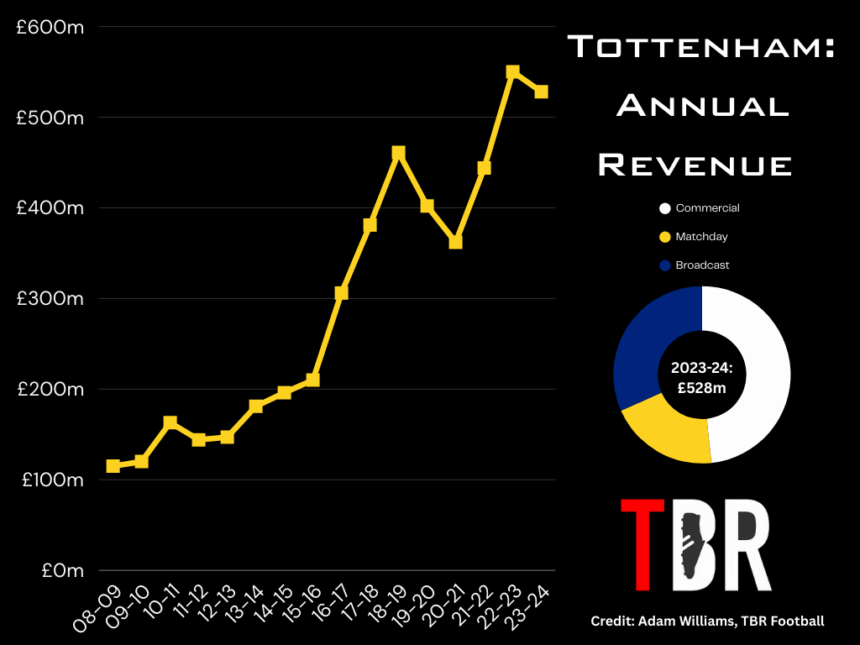It was the best of times, it was the worst of times; Tottenham could finish one place above the relegation this season but also win only the second trophy of the ENIC era.
In many ways, that typifies the duality of Tottenham’s ownership. Daniel Levy and the English National Investment Company (ENIC) do some things very well, others very badly.
That’s why there are a lot of swing voters when it comes to opinions on how the club has been run since the takeover from Alan Sugar in 20011.
Tottenham haven’t won anything for 17 years but still have admirers in the world of football finance for their sustainable approach to business and the way they have scaled the club commercially.
Credit: Adam Williams/TBR Football/GRV Media
But while revenues continue to boom, ENIC and Levy can no longer cling onto the fact the club is financially self-sufficient.
For the very first time, recent years have seen Spurs’ owners put money into the club to cover costs. ENIC have injected £132.5m via share issues since 2022.
Operating losses meanwhile have totalled £126m in the last two years, which is about mid-table by the standards of the Premier League, where most clubs lose money.
The accounts are complex, however, and that £126m figure looks a lot better if you strip out depreciation on the stadium, which is a non-cash expense but hits the balance sheet at about £70m per season.
On the flip side, Spurs pay around £30m annually in interest and have invested heavily in the transfer market with nothing to show for it, unless Ange Postecoglou’s side go on to win the Europa League.
Last season – when they had no lucrative European football – they burned through cash, spending about £95m more than they eared throughout the business.
To cut a long story short, the underlying numbers are solid but it’s the football side of operations that is letting the side down, both in terms of pride and business.
That’s why, with Levy seeking out fresh investment in Spurs, fresh blood could see the club become a genuine contender.
New football regulator with power to block Tottenham takeover is a Spurs fan
Officially, Spurs have been on the market since April last year, when Daniel Levy set out plans for fresh investment in a statement introducing the club’s accounts.
This year’s accounts did not address the search for investment. However, that is not believed to indicate a U-turn from ENIC, who have been looking for buyers privately for far longer than one year.
Qatari sovereign wealth, private equity funds and NFL franchise owners are among the names who have been linked with with a full or partial takeover of Tottenham.
Last year, it was reported that Amanda Staveley of Newcastle United fame had raised around £500m and was looking to invest in Spurs, which suggests that a minority deal is more likely.
It is said that Levy values Tottenham at about £3.75bn, which has allegedly deterred some investors.
Soon, another factor will come into play.
A new regulator for English football will soon be passed into law, with a bill currently making its way through Parliament and expected to be up and running by 2026.
Among other duties, the regulator will have the power to introduce a new owners’ and directors’ test, essentially giving them a veto for takeovers.
As reported by City AM, the man ordained to head up the regulator, David Kogan, is a Spurs fan.
Kogan has previously advised the Premier League and its broadcasters in TV rights negotiations, as well as the EFL and UEFA, and has an impressive CV spanning media, marketing and politics.
Impartiality will – obviously – be key for the regulator, but it can’t hurt to have someone who understands Spurs in a position of power.
And if Levy does budge from his asking price, Kogan could be the executive who rubber-stamps the deal.
Financially, how badly does Daniel Levy need Spurs to win Europa League?
It’s not quite do-or-die for Spurs in the Europa League, where Bodo/Glimt will be their opponents in the semi-final first leg on Thursday.
However, last season’s accounts show how significant the drop-off in revenues can be when there is no European football played in N17.
Daniel Levy rightly points out that rising commercial revenues have supplemented the lack of European revenue, but their cash position shows that it isn’t enough to eliminate the shortfall.
Winning the Europa League would, of course, ensure qualification for the Champions League, where English clubs benefit from the new format and a UEFA distribution system that favours them.
But despite two seasons of heavy spending in the transfer market, Spurs probably need to revamp their squad this summer, which won’t come cheap.
Without Champions League revenues, it will almost certainly be a sell-to-buy situation.
